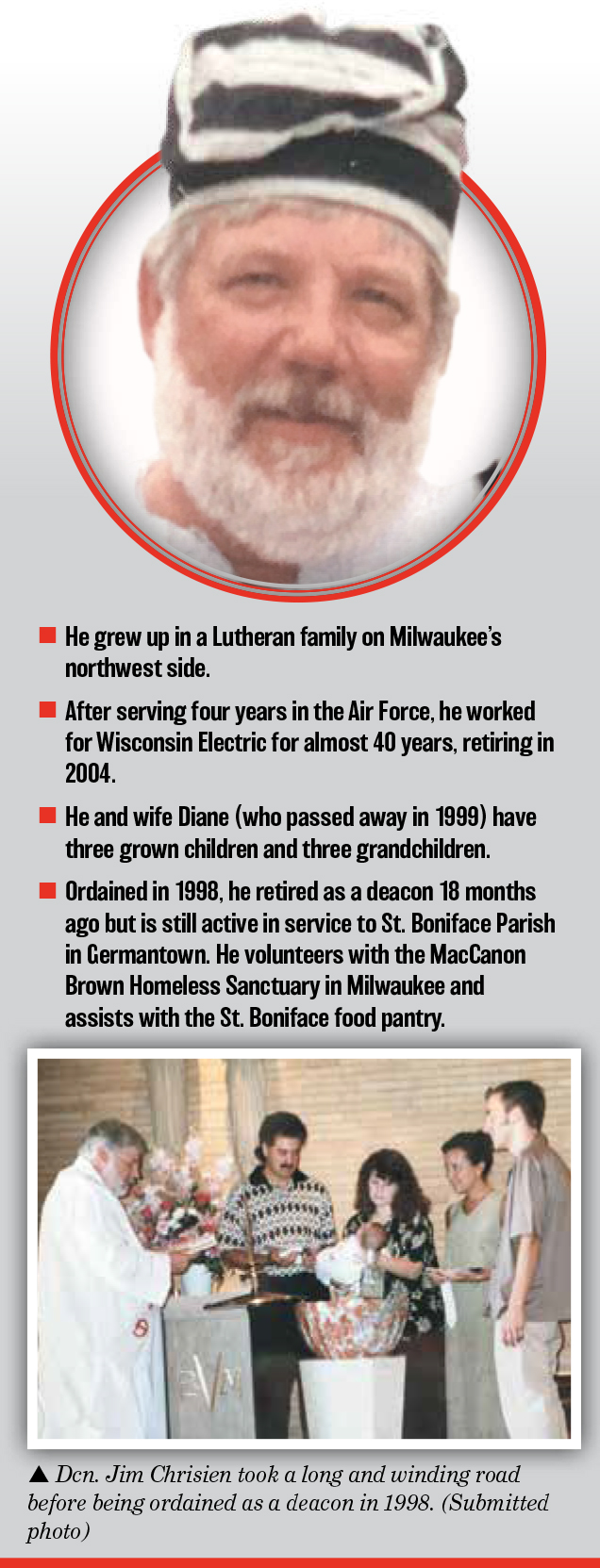COLLEEN JURKIEWICZ
CATHOLIC HERALD STAFF
When did you first feel a call to the diaconate?
The feelings I had to become a deacon started probably in the mid 1980s. I was raised Lutheran and I stayed Lutheran until 1979. I married a Catholic woman — but it was 12 years after we got married that I decided to convert. A neighbor lady actually said, “Hey, there’s a priest I know and I think you’d like him.” She dragged me over to the church and introduced me to Fr. Bernie Sippel, and we’ve been friends ever since. I took my profession of faith in 1979, and I got involved in our parish at the time, Mother of Perpetual Help.
Your journey to ordination was a long one.
I applied for the diaconate in 1988 but I was deferred. In 1992, we moved to Jackson and joined St. Boniface, where Fr. Bernie was at the time. He told me to apply again, and I think I got a good referral from him. I was accepted and found out that about half of our class had been deferred at one time or another. I affectionately called us a “class of losers.” In 1998, about three months before ordination, one of the directors came up and finally said, “Jim, I’m glad you’re in the program. If you can make it, anybody can make it.”
What has been a highlight of your ministry as a deacon?
Working with our sister parish, Sacred Heart in Bolgatanga, Ghana. I went there for the first time in 1998. It was an eye-opening experience, seeing people that are poor and dying. It’s a contrast to our poor and dying here in the United States, which happens more slowly due to lack of medicine or good medical care. The last time I visited, in 2007, I told the pastor that if I didn’t have grandkids, I would move to Africa. He told me, “Jim, we’d love to have you, but we would be afraid you wouldn’t last six months because of the heat.”
What do you like to do in your free time? Do you have any hobbies or hidden talents?
I enjoy going to the casino. I’ve been to Ho Chunk, Oneida, Potawatomi, a couple of the newer casinos they’ve built in Madison and in Green Bay.
What’s your game at the casino?
Slots. I used to joke it was cheap psychiatric care, but after a while, I realized I don’t know which is cheaper — going to see the shrink or going to the casino.
What has been a challenge that you’ve faced as a deacon?
The death of my wife, a year after becoming a deacon. For the four years that we were involved in the program, they put it in your head: now, remember if you become a deacon and your wife passes, you can’t remarry. I had some problems with that after she died. I struggled with it for months. I took a sabbatical and got some professional help, and I think it made a big difference. We talked a lot about fly fishing, believe it or not. He suggested I read the book “Fly Fishing Through the Midlife Crisis.” I didn’t realize I was having a midlife crisis, but apparently, that’s what a mid-life crisis is.
What is the most interesting place you have ever traveled?
Definitely Ghana. We took a side trip to Italy on the way back the last time. We got to see the five major basilicas in Rome and we got to see the Vatican and the catacombs. We stayed in Florence and got to see Michelangelo’s David, and we spent four days in Tuscany. I would go back to Tuscany anytime anybody would take me. It was relaxing, it was beautiful and the people are friendly.
If you could have dinner with anyone, living or dead, who would it be, and what would you talk about?
My initial thought was St. Teresa of Calcutta only to get her viewpoints on how you care for the poor. And then I got to thinking more — my mom for one. She was a big influence on my brothers’ and my life. Obviously my wife — just to see, “OK, tell me what it’s really like in Heaven.”
